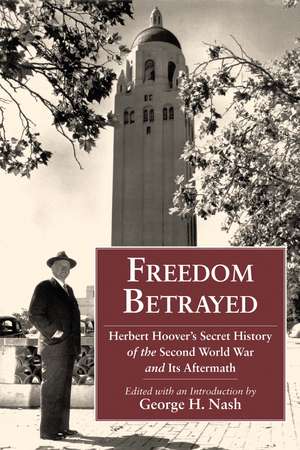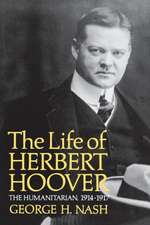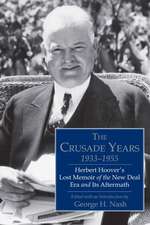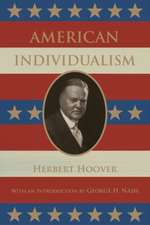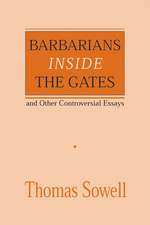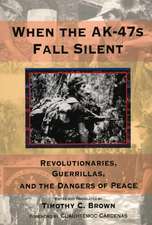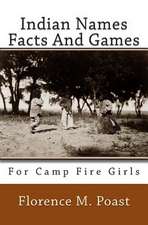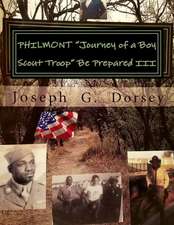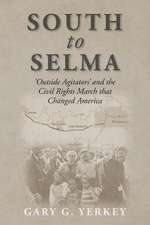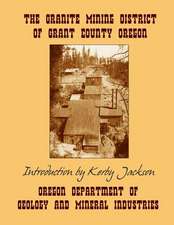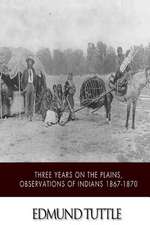Freedom Betrayed: Herbert Hoover's Secret History of the Second World War and Its Aftermath: Hoover Institution Press Publication
Editat de George H. Nashen Limba Engleză Hardback – 6 noi 2011
The culmination of an extraordinary literary project that Herbert Hoover launched during World War II, his "magnum opus"—at last published nearly fifty years after its completion—offers a revisionist reexamination of the war and its cold war aftermath and a sweeping indictment of the "lost statesmanship" of Franklin Roosevelt. Freedom Betrayed: Herbert Hoover's Secret History of the Second World War and Its Aftermath originated as a volume of Hoover's memoirs, a book initially focused on his battle against President Roosevelt's foreign policies before Pearl Harbor. As time went on, however, Hoover widened his scope to include Roosevelt's foreign policies during the war, as well as the war's consequences: the expansion of the Soviet empire at war's end and the eruption of the cold war against the Communists.
On issue after issue, Hoover raises crucial questions that continue to be debated to this day. Did Franklin Roosevelt deceitfully maneuver the United States into an undeclared and unconstitutional naval war with Germany in 1941? Did he unnecessarily appease Joseph Stalin at the pivotal Tehran conference in 1943? Did communist agents and sympathizers in the White House, Department of State, and Department of the Treasury play a malign role in some of America's wartime decisions? Hoover raises numerous arguments that challenge us to think again about our past. Whether or not one ultimately accepts his arguments, the exercise of confronting them will be worthwhile to all.
On issue after issue, Hoover raises crucial questions that continue to be debated to this day. Did Franklin Roosevelt deceitfully maneuver the United States into an undeclared and unconstitutional naval war with Germany in 1941? Did he unnecessarily appease Joseph Stalin at the pivotal Tehran conference in 1943? Did communist agents and sympathizers in the White House, Department of State, and Department of the Treasury play a malign role in some of America's wartime decisions? Hoover raises numerous arguments that challenge us to think again about our past. Whether or not one ultimately accepts his arguments, the exercise of confronting them will be worthwhile to all.
Din seria Hoover Institution Press Publication
-
 Preț: 182.45 lei
Preț: 182.45 lei -
 Preț: 96.24 lei
Preț: 96.24 lei -
 Preț: 128.04 lei
Preț: 128.04 lei -
 Preț: 94.51 lei
Preț: 94.51 lei -
 Preț: 125.04 lei
Preț: 125.04 lei -
 Preț: 141.93 lei
Preț: 141.93 lei -
 Preț: 89.04 lei
Preț: 89.04 lei -
 Preț: 110.71 lei
Preț: 110.71 lei -
 Preț: 334.62 lei
Preț: 334.62 lei - 33%
 Preț: 58.16 lei
Preț: 58.16 lei - 36%
 Preț: 83.74 lei
Preț: 83.74 lei -
 Preț: 115.44 lei
Preț: 115.44 lei -
 Preț: 138.11 lei
Preț: 138.11 lei -
 Preț: 152.27 lei
Preț: 152.27 lei -
 Preț: 98.13 lei
Preț: 98.13 lei - 16%
 Preț: 109.69 lei
Preț: 109.69 lei -
 Preț: 96.94 lei
Preț: 96.94 lei - 18%
 Preț: 177.68 lei
Preț: 177.68 lei - 16%
 Preț: 110.15 lei
Preț: 110.15 lei - 16%
 Preț: 109.23 lei
Preț: 109.23 lei - 21%
 Preț: 136.07 lei
Preț: 136.07 lei - 13%
 Preț: 118.14 lei
Preț: 118.14 lei - 16%
 Preț: 184.30 lei
Preț: 184.30 lei - 17%
 Preț: 108.43 lei
Preț: 108.43 lei - 18%
 Preț: 135.27 lei
Preț: 135.27 lei - 10%
 Preț: 62.62 lei
Preț: 62.62 lei - 16%
 Preț: 109.86 lei
Preț: 109.86 lei -
 Preț: 88.16 lei
Preț: 88.16 lei - 15%
 Preț: 112.63 lei
Preț: 112.63 lei -
 Preț: 84.93 lei
Preț: 84.93 lei - 17%
 Preț: 144.55 lei
Preț: 144.55 lei - 16%
 Preț: 72.61 lei
Preț: 72.61 lei - 18%
 Preț: 177.64 lei
Preț: 177.64 lei - 16%
 Preț: 146.32 lei
Preț: 146.32 lei - 16%
 Preț: 108.60 lei
Preț: 108.60 lei - 16%
 Preț: 110.04 lei
Preț: 110.04 lei - 16%
 Preț: 72.15 lei
Preț: 72.15 lei - 16%
 Preț: 109.95 lei
Preț: 109.95 lei - 15%
 Preț: 150.77 lei
Preț: 150.77 lei - 16%
 Preț: 110.21 lei
Preț: 110.21 lei - 18%
 Preț: 142.32 lei
Preț: 142.32 lei - 18%
 Preț: 178.88 lei
Preț: 178.88 lei - 17%
 Preț: 108.35 lei
Preț: 108.35 lei - 13%
 Preț: 64.35 lei
Preț: 64.35 lei - 13%
 Preț: 116.81 lei
Preț: 116.81 lei
Preț: 386.46 lei
Nou
Puncte Express: 580
Preț estimativ în valută:
73.95€ • 77.21$ • 61.20£
73.95€ • 77.21$ • 61.20£
Carte disponibilă
Livrare economică 15-29 martie
Preluare comenzi: 021 569.72.76
Specificații
ISBN-13: 9780817912345
ISBN-10: 0817912347
Pagini: 1080
Dimensiuni: 152 x 229 x 69 mm
Greutate: 1.6 kg
Ediția:1st Edition
Editura: Hoover Institution Press
Colecția Hoover Institution Press
Seria Hoover Institution Press Publication
ISBN-10: 0817912347
Pagini: 1080
Dimensiuni: 152 x 229 x 69 mm
Greutate: 1.6 kg
Ediția:1st Edition
Editura: Hoover Institution Press
Colecția Hoover Institution Press
Seria Hoover Institution Press Publication
Recenzii
“What an amazing historical find! Historian George H. Nash, the dean of Herbert Hoover studies, has brought forth a very rare manuscript in Freedom Betrayed. Here is Hoover unplugged, delineating on everything from the ‘lost statesmanship’ of FDR to the Korean War. A truly invaluable work of presidential history. Highly recommended.”
—DOUGLAS BRINKLEY is professor of history at Rice University and editor of The Reagan Diaries.
—DOUGLAS BRINKLEY is professor of history at Rice University and editor of The Reagan Diaries.
“Finally, after waiting for close to half a century, we now have Hoover’s massive and impassioned account of American foreign policy from 1933 to the early 1950s. Thanks to the efforts of George H. Nash, there exists an unparalleled picture of Hoover’s world view, one long shared by many conservatives. Nash’s thorough and perceptive introduction shows why he remains America’s leading Hoover scholar.”
—JUSTUS D. DOENECKE, author of Storm on the Horizon: The Challenge to American Intervention, 1939–1941
—JUSTUS D. DOENECKE, author of Storm on the Horizon: The Challenge to American Intervention, 1939–1941
“A forcefully argued and well documented alternative to, and critique of, the conventional liberal historical narrative of America’s road to war and its war aims. Even readers comfortable with the established account will find themselves thinking that on some points the accepted history should be reconsidered and perhaps revised.”
—JOHN EARL HAYNES, author of Spies: The Rise and Fall of the KGB in America
—JOHN EARL HAYNES, author of Spies: The Rise and Fall of the KGB in America
“Freedom Betrayed offers vivid proof of William Faulkner’s famous dictum that “The past is never dead. It’s not even past.” For those who might think that history has settled the mantle of consensus around the events of the World War II era, Hoover’s iconoclastic narrative will come as an unsettling reminder that much controversy remains. By turns quirky and astute, in prose that is often acerbic and unfailingly provocative, Hoover opens some old wounds and inflicts a few new ones of his own, while assembling a passionate case for the tragic errors of Franklin Roosevelt’s diplomacy. Not all readers will be convinced, but Freedom Betrayed is must-read for anyone interested in the most consequential upheaval of the twentieth century.”
—DAVID M. KENNEDY is professor of history emeritus at Stanford University and the author of Freedom From Fear: The American People in Depression and War, 1929–1945.
—DAVID M. KENNEDY is professor of history emeritus at Stanford University and the author of Freedom From Fear: The American People in Depression and War, 1929–1945.
“Herbert Hoover’s Freedom Betrayed is a bracing work of historical revisionism that takes aim at U.S. foreign policy under President Franklin Delano Roosevelt. Part memoir and part diplomatic history, Hoover's magnum opus seeks to expose the “lost statesmanship” that, in Hoover’s eyes, needlessly drew the United States into the Second World War and, in the aftermath, facilitated the rise to global power of its ideological rival, the Soviet Union. Freedom Betrayed, as George Nash asserts in his astute and authoritative introduction, resembles a prosecutor’s brief against Roosevelt—and against Winston Churchill as well— at the bar of history. Thanks to Nash’s impressive feat of reconstruction, Hoover’s “thunderbolt” now strikes—nearly a half-century after it was readied. The former president’s interpretation of the conduct and consequences of the Second World War will not entirely persuade most readers. Yet, as Nash testifies, like the best kind of revisionist history, Freedom Betrayed “challenges us to think afresh about our past.”
—BERTRAND M. PATENAUDE, author of A Wealth of Ideas: Revelations from the Hoover Institution Archives
—BERTRAND M. PATENAUDE, author of A Wealth of Ideas: Revelations from the Hoover Institution Archives
“Nearly fifty years after his death, Herbert Hoover returns as the ultimate revisionist historian, prosecuting his heavily documented indictment of US foreign policy before, during, and after the Second World War. Brilliantly edited by George Nash, Freedom Betrayed is as passionate as it is provocative. Many no doubt will dispute Hoover’s strategic vision. But few can dispute the historical significance of this unique volume, published even as Americans of the twenty-first century debate their moral and military obligations.”
—RICHARD NORTON SMITH is a presidential historian and author, former director of several presidential libraries, and current scholar-in-residence at George Mason University.
—RICHARD NORTON SMITH is a presidential historian and author, former director of several presidential libraries, and current scholar-in-residence at George Mason University.
Notă biografică
The culmination of an extraordinary literary project that Herbert Hoover launched during World War II, his "magnum opus"—at last published nearly fifty years after its completion—offers a revisionist reexamination of the war and its cold war aftermath and a sweeping indictment of the "lost statesmanship" of Franklin Roosevelt. Freedom Betrayed: Herbert Hoover's Secret History of the Second World War and Its Aftermath originated as a volume of Hoover's memoirs, a book initially focused on his battle against President Roosevelt's foreign policies before Pearl Harbor. As time went on, however, Hoover widened his scope to include Roosevelt's foreign policies during the war, as well as the war's consequences: the expansion of the Soviet empire at war's end and the eruption of the cold war against the Communists.
On issue after issue, Hoover raises crucial questions that continue to be debated to this day. Did Franklin Roosevelt deceitfully maneuver the United States into an undeclared and unconstitutional naval war with Germany in 1941? Did he unnecessarily appease Joseph Stalin at the pivotal Tehran conference in 1943? Did communist agents and sympathizers in the White House, Department of State, and Department of the Treasury play a malign role in some of America's wartime decisions? Hoover raises numerous arguments that challenge us to think again about our past. Whether or not one ultimately accepts his arguments, the exercise of confronting them will be worthwhile to all.
On issue after issue, Hoover raises crucial questions that continue to be debated to this day. Did Franklin Roosevelt deceitfully maneuver the United States into an undeclared and unconstitutional naval war with Germany in 1941? Did he unnecessarily appease Joseph Stalin at the pivotal Tehran conference in 1943? Did communist agents and sympathizers in the White House, Department of State, and Department of the Treasury play a malign role in some of America's wartime decisions? Hoover raises numerous arguments that challenge us to think again about our past. Whether or not one ultimately accepts his arguments, the exercise of confronting them will be worthwhile to all.
Textul de pe ultima copertă
Herbert Hoover’s magnum opus—part memoir, part diplomatic history—raises questions that continue to be debated to this day
A window on the mind and worldview of one of the twentieth century’s preeminent leaders, Freedom Betrayed: Herbert Hoover's Secret History of the Second World War and Its Aftermath represents the culmination of an extraordinary literary project that Herbert Hoover launched during World War II. At last published nearly fifty years after its completion—Hoover’s “magnum opus,” as it has been called, offers a revisionist reexamination of the war and its cold war aftermath and a sweeping indictment of the “lost statesmanship” of Franklin Roosevelt.
Freedom Betrayed originated as a volume of Hoover’s memoirs, a book initially focused on his battle against President Roosevelt’s foreign policies before Pearl Harbor. As time went on, however, Hoover widened his scope to include Roosevelt’s foreign policies during the war, as well as the war’s consequences: the expansion of the Soviet empire at war’s end and the eruption of the cold war against the Communists. On issue after issue, Hoover raises crucial questions that continue to be debated to this day—in the process offering many arguments that challenge us to see our past in a different light. Whether or not one ultimately accepts his arguments, the exercise of confronting them will be worthwhile to all.
Herbert Hoover (1874–1964) was president of the United States from 1929 to 1933. An internationally acclaimed humanitarian, he was the author of more than thirty books and founder of the Hoover Institution on War, Revolution and Peace.
A window on the mind and worldview of one of the twentieth century’s preeminent leaders, Freedom Betrayed: Herbert Hoover's Secret History of the Second World War and Its Aftermath represents the culmination of an extraordinary literary project that Herbert Hoover launched during World War II. At last published nearly fifty years after its completion—Hoover’s “magnum opus,” as it has been called, offers a revisionist reexamination of the war and its cold war aftermath and a sweeping indictment of the “lost statesmanship” of Franklin Roosevelt.
Freedom Betrayed originated as a volume of Hoover’s memoirs, a book initially focused on his battle against President Roosevelt’s foreign policies before Pearl Harbor. As time went on, however, Hoover widened his scope to include Roosevelt’s foreign policies during the war, as well as the war’s consequences: the expansion of the Soviet empire at war’s end and the eruption of the cold war against the Communists. On issue after issue, Hoover raises crucial questions that continue to be debated to this day—in the process offering many arguments that challenge us to see our past in a different light. Whether or not one ultimately accepts his arguments, the exercise of confronting them will be worthwhile to all.
Herbert Hoover (1874–1964) was president of the United States from 1929 to 1933. An internationally acclaimed humanitarian, he was the author of more than thirty books and founder of the Hoover Institution on War, Revolution and Peace.
Descriere
Herbert Hoover’s “magnum opus”—at last published nearly fifty years after its completion—offers a revisionist reexamination of World War II and its cold war aftermath and a sweeping indictment of the “lost statesmanship” of Franklin Roosevelt. Hoover offers his frank evaluation of Roosevelt’s foreign policies before Pearl Harbor and policies during the war, as well as an examination of the war’s consequences, including the expansion of the Soviet empire at war’s end and the eruption of the cold war against the Communists.
